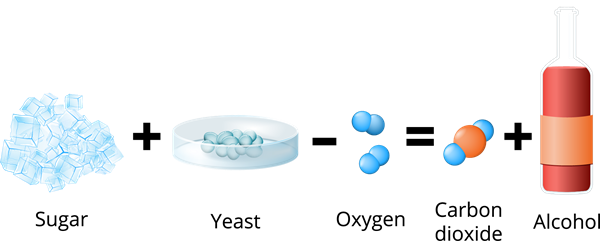PDF chapter test TRY NOW
Microorganisms play a significant role in the production of several valuable industrial products for human welfare. Some of these are given below.
Fermentation:
Fermentation is an anaerobic process by which microorganisms such as bacteria or yeast chemically convert sugar into ethanol.
Since ancient times Saccharomyces cerevisiae (Brewer's yeast) has been used to produce alcoholic beverages from malted cereals, vegetables, seeds and fruit juices for fermentation. Fermented foods and beverages production entirely depend on the type of food, duration of fermentation, and microbes used for fermentation.

Process of fermentation
Curing of coffee beans, tea and tobacco leaves:
The bacteria Bacillus megaterium ferments tea and tobacco leaves, Beans of coffee and cocoa. Bacillus megatherium helps to remove the bitterness from tobacco and tea leaves. Due to the fermentation, it gives a unique aroma.
Production of curd:
- Milk is converted into curd with Lactobacillus acid bacteria (LAB) at a temperature of about \(30\) to \(40\)°C. Lactic acid, which imparts the sour taste to curd, is produced by converting Lactose present in the milk with the help of Lactobacillus.
- In our stomach too, LAB plays a very beneficial role in inhibiting disease-causing microbes.
- TheLactobacillusbacteria produces lactic acid that partially coagulates the milk protein.
- Lactobacillus bacteria increases vitamin B12 content. It is a nutrient that helps synthesise DNA (genetic material) and RBC (red blood cells). Vitamin B12 deficiency causes Anemia, severe damage to the nervous system etc.
\(\text{Milk}\) \(\xrightarrow{\small{\text{at 30°C to 40°C/(Lactobacillus acid bacteria)}}}\) \(\text{Curd}\)
Production of organic acids, enzymes and vitamins:
Acid: Aspergillus niger is a type of fungi that produces oxalic acid, acetic acid and citric acid.
Enzymes: Enzymes like lipases, invertase, proteases, and glucose oxidase are derived from microbes.
Vitamins: Yeasts are a rich source of vitamin-B complex.
